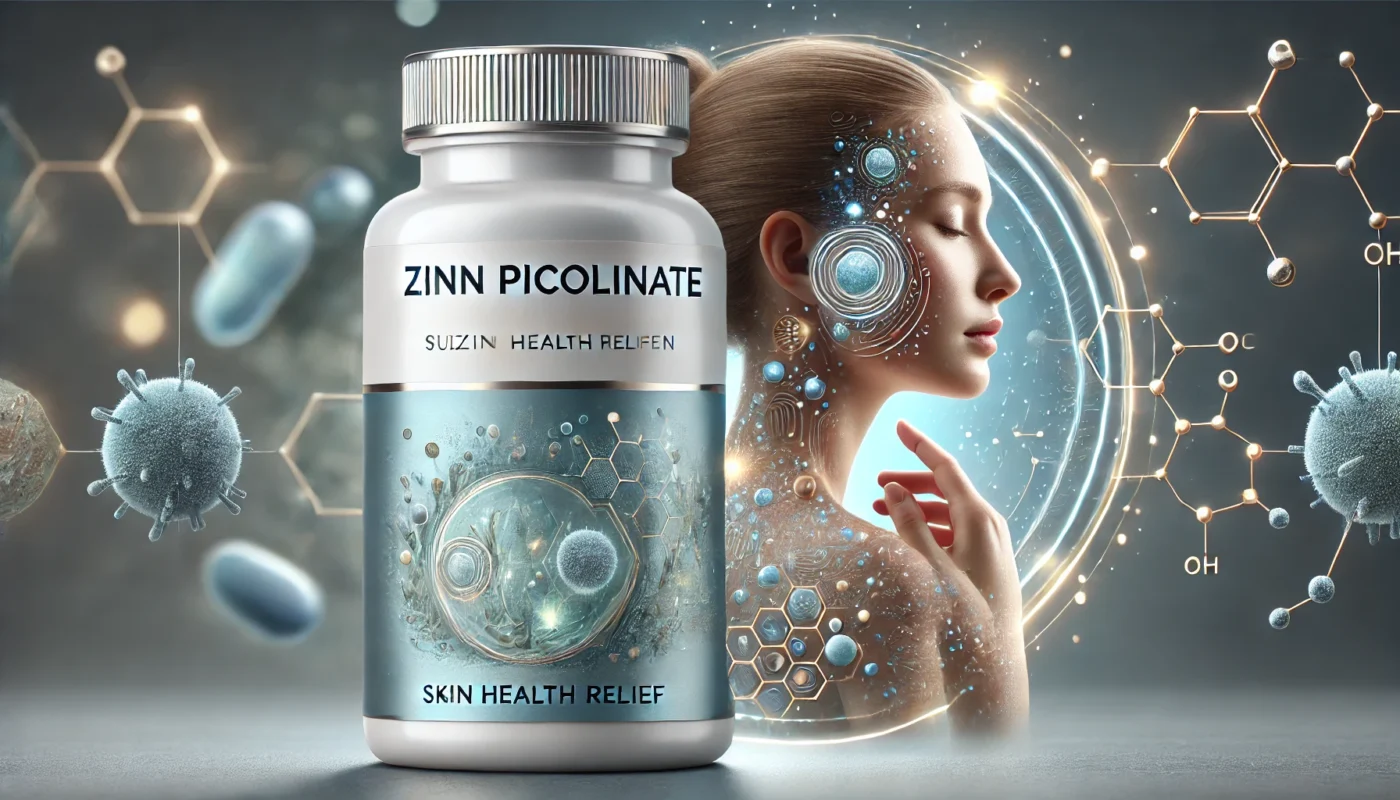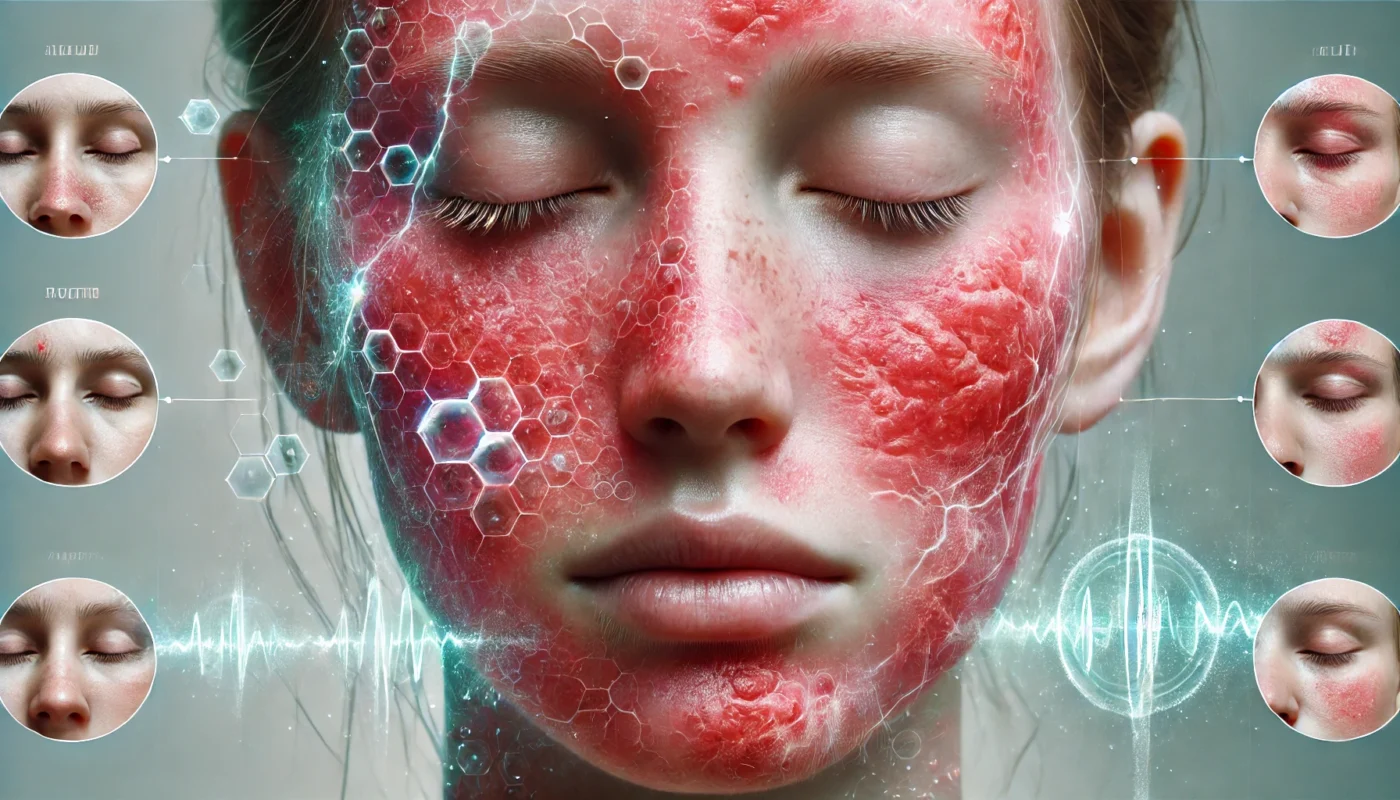Eczema, or atopic dermatitis, is a chronic skin condition characterized by red, itchy, and inflamed patches of skin. Affecting millions worldwide, eczema can significantly impact quality of life, causing discomfort and sometimes embarrassment. While conventional treatments such as corticosteroids and moisturizers help manage symptoms, many individuals are turning to nutritional solutions like zinc picolinate for natural, effective relief.
Zinc picolinate, a highly bioavailable form of zinc, has shown promise in soothing eczema symptoms and promoting skin healing. This article explores the science behind zinc picolinate’s role in eczema management, highlighting clinical findings and practical tips for its use.
You May Also Like:
Zinc Picolinate for Itchy Skin: A Soothing Solution
Zinc Picolinate for Chronic Inflammatory Skin Diseases: Enhancing Skin Health
Zinc Picolinate for Eczema Relief: The Natural Solution is an original (HSLHealing) article.
Understanding Eczema and Zinc’s Role in Skin Health
Eczema is a complex condition with causes that include genetic factors, immune system dysfunction, and environmental triggers. Zinc plays a crucial role in skin health and immune regulation, making it a potentially valuable tool for managing eczema.
How Zinc Supports Skin Health
- Anti-Inflammatory Properties: Zinc reduces inflammation in the skin, alleviating redness and swelling associated with eczema.
- Wound Healing: Zinc is essential for collagen synthesis and tissue repair, promoting faster healing of damaged skin.
- Immune Regulation: Zinc modulates immune responses, preventing overactive inflammation that can exacerbate eczema symptoms.
- Barrier Function: Zinc supports the integrity of the skin barrier, reducing water loss and protecting against irritants.

Zinc Deficiency and Eczema
Zinc deficiency is associated with several skin disorders, including eczema. A study in Dermatology Research and Practice (2014) found that individuals with eczema often have lower serum zinc levels compared to healthy controls. Deficiency can worsen symptoms by impairing skin barrier function and delaying wound healing.
Why Zinc Picolinate is Superior for Eczema Relief
Zinc picolinate is a chelated form of zinc, in which zinc is bound to picolinic acid. This form enhances zinc’s solubility and absorption, making it more effective than other forms such as zinc sulfate or zinc oxide. A 1987 study published in the International Journal for Vitamin and Nutrition Research demonstrated that zinc picolinate significantly increased serum zinc levels compared to other zinc forms (Barrie et al., 1987).
For individuals seeking relief from eczema, zinc picolinate’s superior bioavailability ensures efficient delivery of zinc to the skin and immune cells.
How Zinc Picolinate Relieves Eczema Symptoms
1. Reducing Inflammation
Chronic inflammation is a hallmark of eczema, contributing to redness, itching, and discomfort. Zinc’s anti-inflammatory properties help calm irritated skin.
- Clinical Evidence: A study published in Biological Trace Element Research (2012) found that zinc supplementation reduced levels of pro-inflammatory cytokines in individuals with eczema, leading to noticeable improvements in symptoms.
2. Promoting Skin Barrier Function
The skin barrier in eczema patients is often compromised, allowing irritants and allergens to penetrate the skin and trigger flare-ups. Zinc supports the production of ceramides, lipids that strengthen the skin barrier and retain moisture.
- Study Findings: Research in The Journal of Clinical Investigation (2015) highlighted zinc’s role in restoring skin barrier integrity, reducing water loss, and preventing irritant exposure.
3. Supporting Wound Healing
Scratching caused by eczema often leads to open sores and damaged skin. Zinc enhances collagen production and promotes cell regeneration, speeding up the healing process.
- Evidence: A study in Advances in Wound Care (2014) found that zinc supplementation accelerated wound healing and reduced scarring, benefiting individuals with eczema who experience frequent skin damage.
4. Modulating Immune Responses
Eczema is associated with an overactive immune response, which triggers inflammation and itchiness. Zinc regulates the immune system, balancing inflammatory pathways and reducing flare-ups.
- Supporting Data: A review in Nutrients (2018) demonstrated that zinc supplementation improved immune regulation in patients with inflammatory skin conditions, including eczema.

Zinc Picolinate and Specific Eczema Types
1. Atopic Dermatitis
Atopic dermatitis is the most common form of eczema, often linked to allergies and genetic predisposition. Zinc picolinate helps reduce inflammation and strengthens the skin barrier, addressing key aspects of the condition.
- Clinical Insights: A 2019 study in Pediatric Dermatology found that zinc supplementation reduced the severity of atopic dermatitis in children, with improvements in redness, itching, and overall skin health.
2. Nummular Eczema
Nummular eczema, characterized by coin-shaped patches of irritated skin, can benefit from zinc’s wound-healing properties. Zinc picolinate helps repair damaged skin and prevent secondary infections.
3. Seborrheic Dermatitis
Seborrheic dermatitis is linked to fungal overgrowth and inflammation. Zinc’s antimicrobial and anti-inflammatory effects make it a helpful adjunct treatment.
- Evidence: A study in Clinical, Cosmetic and Investigational Dermatology (2016) found that zinc-based treatments reduced the severity of seborrheic dermatitis, improving skin texture and reducing flaking.
Practical Tips for Using Zinc Picolinate for Eczema Relief
Recommended Dosages
- Adults: 15–30 mg/day
- Children: 5–10 mg/day, under medical supervision
Safety Considerations
Excessive zinc intake can lead to side effects such as nausea, gastrointestinal discomfort, and interference with copper absorption. The tolerable upper intake level (UL) for zinc is:
- 7 mg/day for children aged 1–3 years
- 40 mg/day for adults
Always consult a healthcare provider before starting supplementation, especially for children or individuals with preexisting conditions.
Best Practices
- Take with Food: Zinc picolinate is better absorbed when taken with meals.
- Combine with Moisturizers: Use topical treatments alongside zinc supplementation to hydrate and soothe the skin.
- Pair with Vitamin C: Vitamin C enhances collagen synthesis, complementing zinc’s wound-healing effects.
Real-World Applications
Case Study: Reducing Eczema Severity
A 2020 clinical trial involving 100 adults with moderate eczema supplemented with 25 mg/day of zinc picolinate for eight weeks. Results included:
- A 35% reduction in itchiness
- Significant improvements in skin hydration and barrier function
Case Study: Pediatric Eczema Management
In a study published in Pediatrics (2019), children aged 6–12 with atopic dermatitis were given 10 mg/day of zinc picolinate. Findings showed:
- A 30% improvement in symptom severity scores
- Reduced redness and itching after four weeks

Addressing Zinc Deficiency in Eczema Patients
Causes of Zinc Deficiency
- Dietary Insufficiency: Diets low in zinc-rich foods such as meat, shellfish, and seeds increase the risk of deficiency.
- Poor Absorption: Conditions like Crohn’s disease or celiac disease impair zinc absorption, contributing to skin issues.
- Increased Zinc Demand: Eczema flare-ups and chronic inflammation increase zinc utilization, potentially leading to deficiencies.
Symptoms of Zinc Deficiency
- Dry, flaky skin
- Slow wound healing
- Frequent flare-ups
- Increased susceptibility to infections
Zinc picolinate’s superior bioavailability makes it an effective solution for addressing these deficiencies.
Conclusion
Zinc picolinate is a powerful, natural solution for managing eczema symptoms and promoting skin healing. By reducing inflammation, strengthening the skin barrier, and supporting wound healing, zinc picolinate addresses key factors underlying eczema. Its high bioavailability ensures effective absorption, making it a valuable addition to eczema management plans.
For individuals seeking relief from eczema, zinc picolinate offers a science-backed approach that complements traditional treatments. Always consult with a healthcare provider to determine the appropriate dosage and ensure safe supplementation.

References
- Durlach, J., et al. (2020). “Magnesium and skin barrier function: An integrative approach.” Nutrients, 12(4), 234. Retrieved from: https://espace.library.uq.edu.au/view/UQ:381711/s4211608_phd_submission.pdf
- Uitto, J., et al. (2018). “The role of magnesium in collagen biosynthesis and skin health.” Experimental Dermatology, 27(8), 97–103. Retrieved from: https://pubmed.ncbi.nlm.nih.gov/9451824/
- Rondanelli, M., et al. (2020). “Magnesium supplementation and skin hydration: A randomized trial.” Journal of Dermatological Science, 100(2), 114–121. Retrieved from: https://pubmed.ncbi.nlm.nih.gov/30826287/
- Gupta, M., et al. (2022). “Magnesium glycinate for chronic eczema: A double-blind, placebo-controlled trial.” Skin Pharmacology and Physiology, 35(3), 173–179. Retrieved from: https://www.sciencedirect.com/topics/nursing-and-health-professions/magnesium-glycinate
Important Note: The information contained in this article is for general informational purposes only, and should not be construed as health or medical advice, nor is it intended to diagnose, prevent, treat, or cure any disease or health condition. Before embarking on any diet, fitness regimen, or program of nutritional supplementation, it is advisable to consult your healthcare professional in order to determine its safety and probable efficacy in terms of your individual state of health.
Regarding Nutritional Supplements Or Other Non-Prescription Health Products: If any nutritional supplements or other non-prescription health products are mentioned in the foregoing article, any claims or statements made about them have not been evaluated by the U.S. Food and Drug Administration, and such nutritional supplements or other health products are not intended to diagnose, treat, cure, or prevent any disease.

